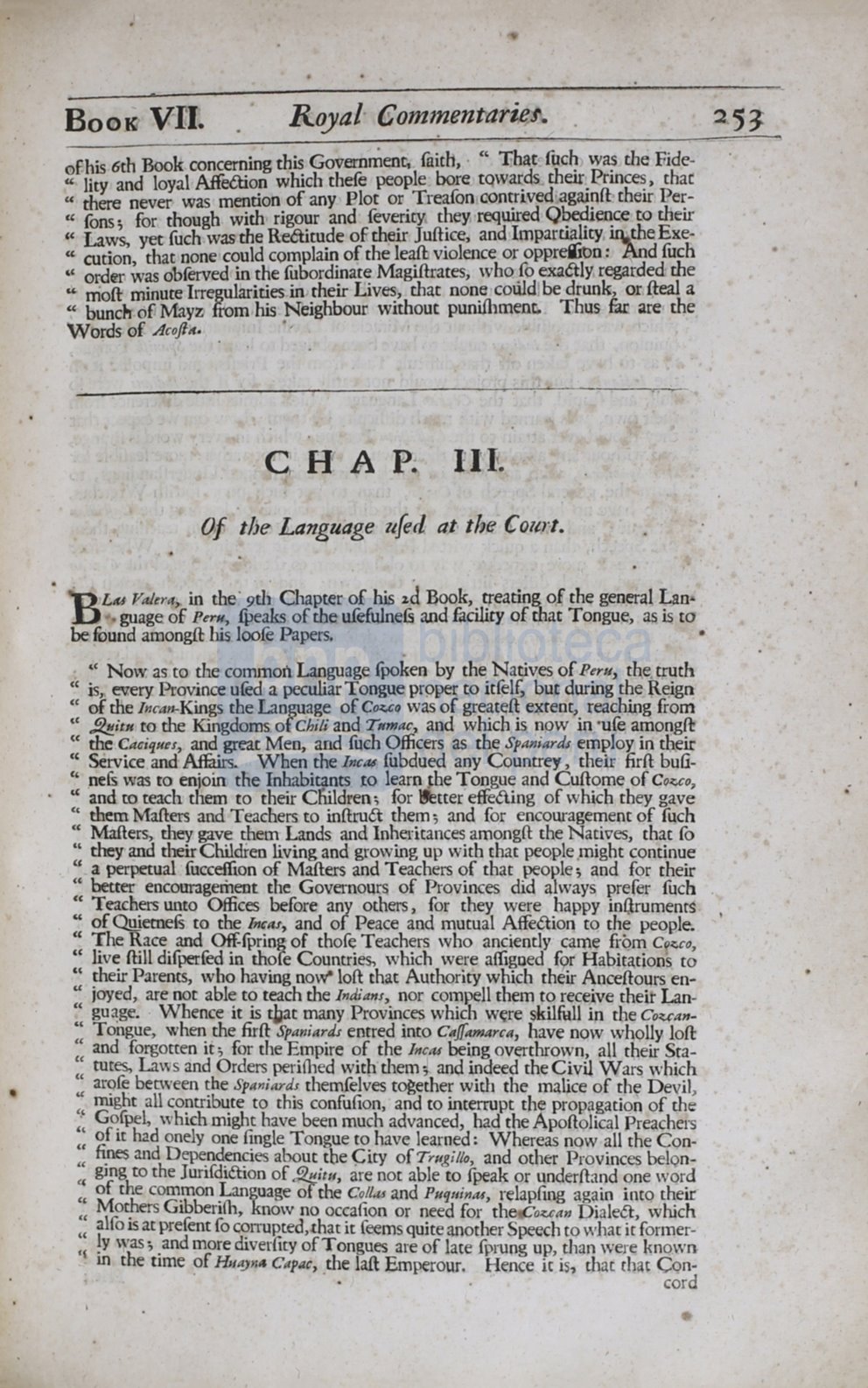

Booi VII.
Royal
Commentarie~./
0
f
his 6th
Book concerning
this GovfllDmenr,
faith,
c'
T,hat
foe~ w~
the Fide–
c,
lity
and loyal
Affecnon which
thefe people bore
towa~ds
their.
Prmce~,
that
" there
never
was
mention of any Plot or.
T1~on con~nved
agai!1ft.
thell'
Pe~" fons;
for
though
with
rigour
and
f
ev~r-ity ~ey
reqwred
Q~~1e~ce
to
their
'' Laws,
yet
fuch
was the
Reetitude
of thmr
Juft1ce,
and
Imparualicy
theExe–
" cudon that
none
could complain
of
the leaft
violence or oppreiitm :
And fuch
'' ordrtr ;,as
obferved
in
the
fubordinar~
Magifuates,
who
fo
exaetly
regarded
the
" moft minute
Irregularities
in
rheir
Lives,
chat
none cotild,be
drunk,
or
fteal
a
" bunch- of Mayz
from
his
Neighbour
without puniihment. Thus
fur
are
the
Words
Ci>f
Acofttt·
C, HAP;
Of the Language ufed at the
Co11-r·t.
•
~.LM
Valera;,
in
tbe·
9ili
Cha{>ter
of
his
2..<d
Book,
treating
of
the general
L.an•
D
guage of
Pere,
fl}eaks of
the
uf~(ulnets
and
facilicy
of mac Tongue,
as
i& tobe
founcd amongft
his
loofe
Papers.
•
'' Now
4s
to t111e
common.
L~nguage
fpokeo
by
the
Natives
of
Per11,
the.truth
cc
is,
ev.ery
Prov.ince
uied
a
peculiar
Tong_ue
pr9~
to it(elf; but
during
the Reign
" of
the
Jncan-Kings
the
Language
of
Co~Q
was of greatefi extent, reaching
from
''
~itu·
to
the Kingdoms of
Chili
and
Tttmac,
and which
is
now in ·ufe
amoqgA:
(( me
Caoiqucs,,
and
great
Men, and fueh Officers
as
the
Spani11rds
employ in their
" Service and
Affaiis4
When the
IncM
fubdued
any
Countrey,
their
firft
buli–
,, nefs was ro enjoin
the
Inhabitants
J:O
learn
~he
Tongue
and
Cufiome of
Co~co~
" and ro teach
them
to their Cliildren; for I.fetter effetling of which they gave
'' themMafters and Teachers to
infuuCt
them; and
for
encouragement of fuch
" Mafl:ers,
t:hey
gave
them
Lands and Inheritances amongfr the Natives, that
fo
'' they
and
their
Children living and growing up with that
people
might continue
" a
perpetual
fuccefiion
Qf
Mafters and
Teachers
of
that people;
and for
their
" b€tter encouragement the Governours of Provinces
did
always prefer
fuch
" Teachers
unto
Offices
before
any others, for they were
happy
inllrumems
" ofQIDemetS to the
Inca.t..,
and of Peace and mutual
Affettion
to the people.
" The Race and
()ff:fpring of
thofe
Teachers who anciently came frqm
CQ~co,
" live fiill difperfed
in
thofe Countries,
which were affigned
fs~r Habit:~tions
to
'' their Parents, who having now loft
that
Authority which
their
Ancell:ours en–
" joyed, are not
able
to
teach
the
Indians,
nor
corn~ell
them to
receive
their Lan–
" guage.
Whence
it
is
at
many
Provinces which Wt:re
skilfull
in
the
Co~an" Tongue, when the
firfr
Spaniards
entred i
nto c~J{t{marc11,
have
now wholly loft
«
and
forgotten
it;
for
the
Empire
of the
Inc.tUbeing
overthrown,
all
their
Sta–
" rotes, Laws
and
Orders perHhed with the
m and indeed the Civil
Wars
which
'' ar?fe between the
Spaniard.;
themfelves
together with the ma.lice of
th~
Devil,
" rmght all
contribute to
this
confufion, and to
interrupt
th~
propagation of
th~
:' Gofpe4 which might have been much advanced, had the Apoll:olical Preachers
' of
it
had onely one fingle Tongue to have learned:
Whereas
now all the Con–
:; fines and Dependencies about the City of
Trugi!lo,
and
other Provinces belon–
" ging to the Jurifdietion of
~itu,
are
not
able to fpeak
or
under1land one word
,, of ihe
com~on ~guage
of the
Co/ltf,f
and
Puquina-1,
relapfing
again into their·
Mothers
Gibbenfh~
know
no occafion or need
for
the
Couan
Dialecr which
;; alfo
is
at prefent
fo
corrupted, that
it
feems quite another Speech to what
i(
former–
'' !Y
was; .and more divedity ofTongues are of late fprung up, than
weJe
known
. m the
time
of
HJ1ayru1
Capac,
the laft Emperour. Hence
it
is,
that that
Con-
,
·
cord
.
'














